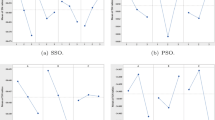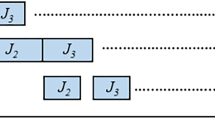Abstract
We consider the problem of makespan minimization on a flexible flow shop with k stages and m s machines at any stage. We propose a heuristic algorithm based on the identification and exploitation of the bottleneck stage, which is simple to use and to understand by practitioners. A computational experiment is conducted to evaluate the performance of the proposed method. The study shows that our method is, in average, comparable with other bottleneck-based algorithms, but with smaller variance, and that it requires less computational effort.
Similar content being viewed by others
References
Acero, M., Montoya-Torres, J. R., & Paternina-Arboleda, C. D. (2004). Scheduling jobs on a k-stage flexible flow shop. In A. Oulamara & M. C. Portmann (Eds.), Proceedings of the ninth international workshop on project management and scheduling (pp. 242–245).
Allaoui, H., & Artiba, A. (2006). Scheduling two-stage hybrid flow shop with availability constraints. Computer and Operation Research, 33, 1399–1419.
Azizoglu, M., Cakmak, E., & Kondakci, S. (2001). A flexible flowshop problem with total flow time minimization. European Journal of Operational Research, 132, 528–538.
Bertel, S., & Billaut, J. C. (2004). A genetic algorithm for an industrial multiprocessor flow shop scheduling problem with recirculation. European Journal of Operational Research, 159, 651–662.
Botta-Genoulaz, V. (2000). Hybrid flow shop scheduling with precedence constraints and time lags to minimize maximum lateness. International Journal of Production Economics, 64, 101–111.
Brah, S. A., & Hunsucker, J. L. (1991). Branch and bound algorithm for the flow shop with multiple processors. European Journal of Operation Research, 51, 88–99.
Chen, B. (1994). Scheduling multiprocessor flowshops. In Advances in optimization and approximation. Dordrecht: Kluwer.
Chen, B. (1995). Analysis of classes of heuristics for scheduling a two-stage flow shop with parallel machines at one stage. Journal of the Operational Research Society, 46, 234–244.
Dessouky, M., Dessouky, M., & Verma, S. (1998). Flowshop scheduling with identical jobs and uniform parallel machines. European Journal of Operational Research, 109, 620–631.
Djellab, H., & Djellab, K. (2002). Preemptive hybrid flowshop scheduling problem of interval orders. European Journal of Operational Research, 137, 37–49.
Fisher, R., & Tippett, L. (1928). Limiting forms of the frequency distribution of the largest or smallest member of a sample. Proceedings of the Cambridge Philosophical Society, 24, 180–190.
Ghashghai, E., & Rardin, R. L. (1998). Using a hybrid of exact and genetic algorithms to design survivable networks. In Working paper school of industrial engineering, Purdue University.
Goldratt, E., & Cox, J. (1992). The goal. North River Press.
Guinet, A., & Solomon, M. (1996). Scheduling hybrid flowshops to minimize maximum tardiness or maximum completion time. International Journal of Production Research, 34, 1643–1654.
Gupta, J. (1988). Two stage hybrid flow shop scheduling problem. Journal of the Operations Research Society, 38, 359–364.
Haouari, M., & M’Hallah, R. (1997). Heuristic algorithms for the two-stage hybrid flowshop problem. Operations Research Letters, 21, 43–53.
Jin, Z., Yang, Z., & Ito, T. (2006). Metaheuristic algorithms for the multistage hybrid flowshop scheduling problem. International Journal of Production Economics, 100, 322–334.
Jungwattanakit, J., Reodecha, M., Chaovalitwongse, P., & Werner, F. (2006). Sequencing heuristics for flexible flow shop problems with unrelated parallel machines and setup times. In Proceedings of the 2006 IE network national conference, Bangkok, 18–19 December 2006 (Session F53, pp. 1–8).
Lee, C. Y., & Vairaktarakis, G. (1994). Minimizing makespan in hybrid flowshops. Operations Research Letters, 16, 149–158.
Linn, R., & Zhang, W. (1999). Hybrid flow shop scheduling: A survey. Computers and Industrial Engineering, 37, 57–61.
Moursli, O., & Pochet, Y. (2000). A branch and bound algorithm for the hybrid flow shop. International Journal of Production Economics, 64, 113–125.
Oguz, C., Zinder, Y., Dob, V. H., Janiak, A., & Lichtenstein, M. (2004). Hybrid flow shop scheduling problems with multiprocessor task systems. European Journal of Operational Research, 152, 115–131.
Ovacık, I. M., Rajagopalan, S., & Uzsoy, R. (2000). Integrating interval estimates of global optima and local search methods for combinatorial optimisation problems. Journal of Heuristics, 6, 481–500.
Pinedo, M. (1994). Scheduling: Theory, algorithms, and systems. Englewood Cliffs: Prentice-Hall.
Portmann, M. C., Vignier, A., Dardilhac, D., & Dezalay, D. (1998). Branch and bound crossed with GA to solve hybrid flowshops. European Journal of Operational Research, 107, 389–400.
Rardin, R. L., & Uzsoy, R. (2001). Experimental evaluation of heuristic optimisation algorithms: A tutorial. Journal of Heuristics, 7, 261–304.
Riane, F., Artiba, A., & Elmaghraby, S. E. (1998). A hybrid three-stage flexible flowshop problem: Efficient heuristics to minimize makespan. European Journal of Operational Research, 109, 321–329.
Riane, F., Artiba, A., & Iassinovski, S. (2001). An integrated production planning and scheduling system for hybrid flowshop organizations. International Journal of Production Economics, 74, 33–48.
Ruíz, R., & Maroto, C. (2006). A genetic algorithm for hybrid flowshops with sequence dependent setup times and machine eligibility. European Journal of Operational Research, 169, 781–800.
Santos, D. L., Hunsucker, J. L., & Deal, D. E. (1995). Global lower bounds for flowshops with multiple processors. European Journal of Operational Research, 80, 112–120.
Sawik, T. (2002). An exact approach for batch scheduling in flexible flow lines with limited intermediate buffers. Mathematical and Computer Modelling, 36, 461–471.
Sivrikaya Serifoglu, F., & Ulusoy, G. (2004). Multiprocessor task scheduling in multistage hybrid flow-shops: a genetic algorithm approach. Journal of the Operational Research Society, 55, 504–512.
Soewandi, H., & Elmaghraby, S. E. (2001). Sequencing three-stage flexible flowshops with identical machines to minimize makespan. IIE Transactions, 33, 985–993.
Sriskandarajah, C., & Wagneur, E. (1991). Hierarchical control of the two processor flow-shop with state dependent processing times: Complexity analysis and approximate algorithms. INFOR, Canadian Journal of Information Systems and Operational Research, 29, 193–205.
Tang, L., Xuan, H., & Liu, J. (2006). A new Lagrangian relaxation algorithm for hybrid flowshop scheduling to minimize total weighted completion time. Computers and Operations Research, 33, 3344–3359.
Vignier, A., Commandeur, P., & Proust, C. (1997). New lower bound for the hybrid flowshop scheduling problem. In Proceedings of the 1997 IEEE conference on emerging technologies and factory automation (pp. 446–451).
Xuan, H., & Tang, L. (2007). Scheduling a hybrid flowshop with batch production at the last stage. Computers and Operations Research, 34, 2718–2733.
Zanakis, S. H. (1979). A simulation study of some simple estimators of the three-parameter Weibull distribution. Journal of Statistical Computing and Simulation, 9, 419–428.
Author information
Authors and Affiliations
Corresponding author
Rights and permissions
About this article
Cite this article
Paternina-Arboleda, C.D., Montoya-Torres, J.R., Acero-Dominguez, M.J. et al. Scheduling jobs on a k-stage flexible flow-shop. Ann Oper Res 164, 29–40 (2008). https://doi.org/10.1007/s10479-007-0257-2
Received:
Accepted:
Published:
Issue Date:
DOI: https://doi.org/10.1007/s10479-007-0257-2




